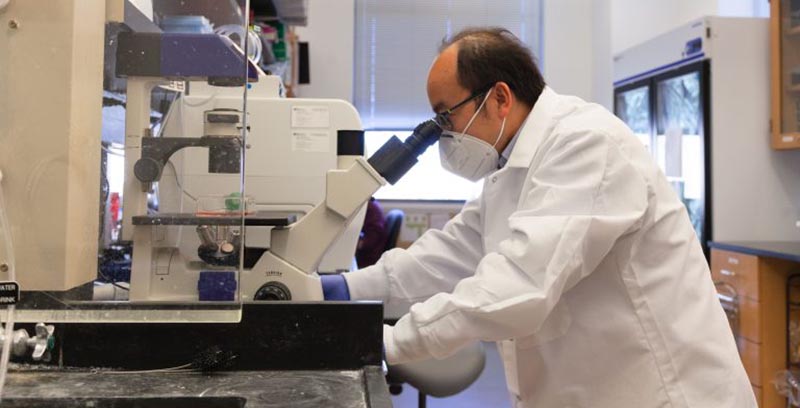October 10, 2022

Professor Xiu-Feng “Henry” Wan has received a $5 million grant from the U.S. Department of Agriculture to investigate how SARS-CoV-2 impacts various species of animals and whether those animals might send new variants of the virus back to us.
“This happened with influenza,” said Wan, who has been studying flu transmission for over 15 years. “It can go from humans to animals then get into reservoirs and come back to humans.”
Wan is director of the NextGen Center for Influenza and Emerging Infectious Diseases with joint appointments in engineering, medicine and veterinary medicine and is a primary investigator at the Bond Life Sciences Center.
Wan expanded his work to include SARS-CoV-2 at the beginning of the COVID pandemic. Since then, he and collaborators have made some interesting discoveries around the virus. For instance, they found that those who received influenza vaccines were protected not only against the flu but also against co-infection of Omicron — even more so than the earlier Delta variant. And they determined that SARS-CoV-2 can cause serious issues in fetuses if a pregnant woman becomes infected. Wan was also on the team that’s been tracking the virus in wastewater.
With the three-year USDA grant, Wan and his team will take a closer look at how SARS-CoV-2 affects certain species of wildlife, especially those with potential interactions with humans, such as deer, elk, large cats, swine, birds and rodents.
Different types of animals respond differently to viruses. The problem is when a virus is strong enough to jump from species to species and survive, it can evolve and mutate. Thus, a vaccine designed to protect against one variant may not be effective when a new variant emerges. That’s why flu shots — and now COVID boosters — are recommended every year.
“We’ve seen earlier variants of SARS-CoV-2 disappear in humans, but if they’re still in animals, that can be problematic,” Wan said. “They can change into new variants and affect us again, and our current vaccines will fail.”
Even if the virus doesn’t mutate, an animal carrying an original variant can still pose a threat to those who have never received a vaccine for it — as was the case when COVID emerged in 2019.
By gaining a better understanding of how SARS-CoV-2 affects specific animals, and how it mutates to fit the genetic makeup of different species, Wan ultimately hopes the work can help prevent another worldwide pandemic.
It’s a tall task that requires an interdisciplinary approach.
“It involves very interesting biology,” Wan said. “The engineering part is also very important. We have informatics and computer science students who are using machine learning/AI and structure modeling to understand how the virus binds to receptors. It’s a complicated problem, but we are excited to work on this project.”
Conduct research alongside world-class faculty solving real-world problems. Apply today!